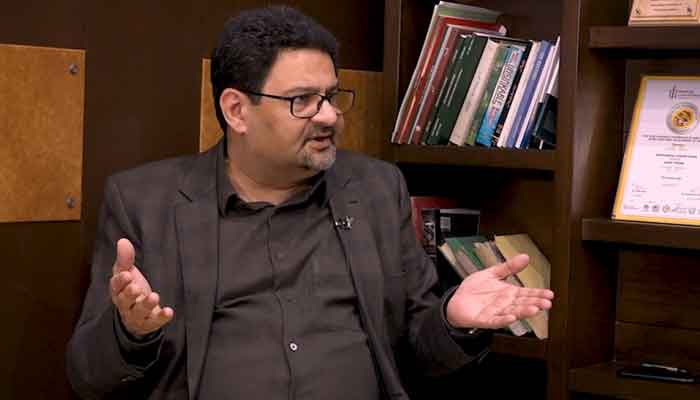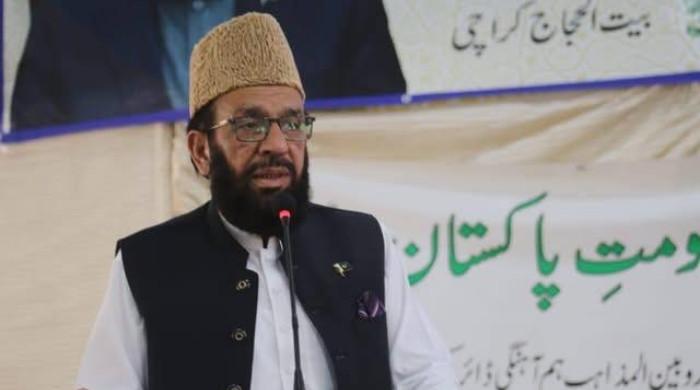Neither Imran nor Nawaz can improve things, Pakistan needs systemic changes: Miftah Ismail
"I don’t think PML-N will make a clean sweep at polls," Miftah Ismail tells Geo.tv in an exclusive interview
March 11, 2023

- Miftah Ismail urges for consensus on national economic policy.
- Says systemic changes are needed to achieve prosperity.
- "I will not participate in electoral politics," says PML-N leader.
No political leader or martial law can improve the system in Pakistan until we make systemic changes, former finance minister Miftah Ismail said as he assessed the dynamics of the country belonging to 220 million people.
As the nation continues its struggle to find a way forward, the Pakistan Muslim League-Nawaz leader — in an exclusive interview to Geo.tv — highlights the problems faced by Pakistanis, identifies where these problems lie, and suggests some possible solutions to manage the situation.
He believes that whether Pakistanis have Pakistan Tehreek-e-Insaaf (PTI) Chairman Imran Khan, his party supremo Nawaz Sharif, Pakistan Peoples Party (PPP) Co-Chairman Asif Ali Zardari or martial law, nothing will improve the system until “we make systemic changes”.
Miftah, who served as the finance minister under the current coalition government for just over five months, has been quite vocal about certain party decisions and especially the policies of the incumbent Finance Minister Ishaq Dar.
Since the former finance czar was “fired” in September as the top leadership of PML-N wanted to bring Dar, Miftah has not been a part of the government’s economic team and spearheading the "Reimagining Pakistan" campaign along with other political leaders in an effort to develop a consensus on the strategy to steer the country out of crises.
During his tenure at the Q Block, Miftah Ismail, a PhD in economics from Wharton School, took some important and tough decisions that convinced the International Monetary Fund (IMF) to release nearly $2 billion which were pending due to the suspended bailout programme signed in 2019 by the PTI government. He was appreciated for his hard work by Prime Minister Shehbaz Sharif in reviving the much-needed loan programme.
“After I left, I had decided that I will not participate in electoral politics,” Miftah told Geo.tv in response to a question regarding his political future.
The PML-N stalwart also confirmed that he wasn't in contact with the incumbent government.
Shedding light on the problems on the political front, Miftah said Pakistan has seen many leaders “we have seen martial laws, hybrid regimes, Imran Khan, Asif Ali Zardari, Nawaz Sharif, Shehbaz Sharif but one thing that we have not seen is a real improvement in peoples lives.”
“We still have half of our school-going children out of schools which means they will grow up to be not literate and if half your population is not literate then I don’t really care who the finance minister is as this country’s economy will not do well,” he said, lamenting the conditions of the people in Pakistan who are reeling with the impact of the record-breaking inflation – which he termed as the “worst challenge” for the country at the moment.
Inflation based on the consumer price index clocked in at 31.5% last month after nearly five decades suggesting that with each passing day, Pakistanis are losing their purchasing power.
‘I don’t think PML-N will clean sweep in polls’
In response to a question regarding his take on the much-anticipated general elections, Miftah — with a hearty laugh — said that he doesn’t see any party sweeping the elections; however, the PML-N leader was sure that he “absolutely don’t see PML-N sweeping the elections.”
With a subtle smile on his face, Miftah somewhat agreed that Khan has a huge support bank and PML-N has shed a lot of its voters perhaps a quarter of its voters in Punjab.
Regarding the upcoming elections in Punjab — which are scheduled to be held on April 30 — the former finance minister explained that the PPP is still not salient in Punjab; however, some leaders who win on certain seats secure victory because of their credibility and name.
“[The] PPP has absolutely no foot in the door in Punjab, however, it has significant following in interior Sindh,” he said, acknowledging that Karachi again is now largely a PTI city.
Whom will Miftah vote for?
When asked whether he would cast his vote in favour of PML-N or not, Miftah said he would; however, the former finance minister was ready to stay at home and waste his vote if the Nawaz-led party fail to choose a “suitable candidate” from his area.
During the interview, he was also reminded of his promise made back in 2021 that he would make much-loved jelly Chilli Milli juicier if people vote for PML-N. However, he avoided the question laughing out loud while mumbling that the people aren’t voting for the PML-N.
‘Absolutely no competence’
Speaking about the problem with all political parties, Miftah said that any political party be it PML-N, PPP or PTI needs to talk to the people of Pakistan asking them about their real problems and needs.
“When you hear the leaders today you hear them say that I want to be the prime minister, there is one leader who is more into I, me and myself than others but it is all about them.
“Nobody is talking about the people of Pakistan what about the 60% of people who have Rs40,000 a month as their family income? What about the young people who cannot find jobs? What about the people living in rural areas? What about an average Pakistani child failing in science and mathematics?
“Nobody is talking about real solutions that are required. Our politics is just a fight for power nothing else. There are no new ideas and absolutely no competence,” he maintained.
‘Why do students fail in mathematics and science’
Sharing some astonishing facts and figures, the former finance minister revealed that in Pakistan still nearly 40% of children are stunted, 17% are wasted and another 28% are malnourished.
He said: “Around 86% of the Pakistani children do not have the dietary requirements met and I guarantee you this that if a child is not given dinner and breakfast no teacher in the world can teach them mathematics and science that is why average Pakistani child fails in both subjects.
“We have not increased the size of the pie so we fight — we fight over the quota system we say certain people belonging to certain sectors should get a job, but the fact of the matter is that poor people in Pakistan are poor everywhere, similar lives no matter where you live,” he added.
“Whether you have Imran Khan, Nawaz Sharif, Asif Ali Zardari or a martial law nothing will improve the system until we make systemic changes bring every Pakistani along and then increase the size of the pie.”











